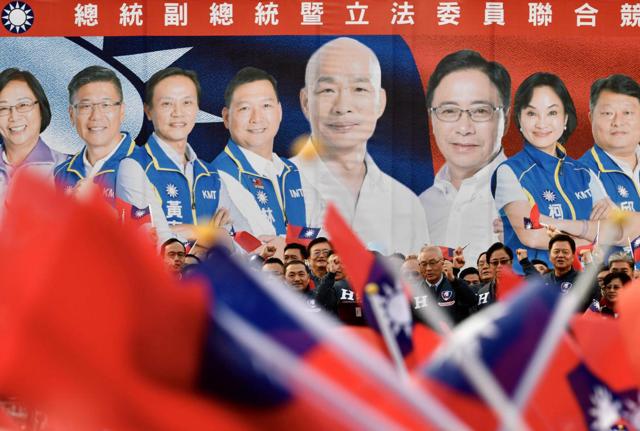Esteri
Taiwan 2020 election, Kuomintang: "A harmonious relationship with PRC is the best policy"
Interview with I-Ding Wu, Kuomintang's legislative candidate
There are less than 20 days to presidential and legislative elections in Taiwan. Elections that People's Republic of China will follow carefully, since it considers Taiwan (officially recognized from 15 world countries now) part of its territory. After an introductory overview of the vote, Affaritaliani.it is proposing interviews with some polical exponents. After the Democratic Progressive Party (DPP), and the smaller Green Party Taiwan, it's now Kuomintang's turn with I-Ding Wu, one of the legislative candidates. Kuomintang, after the 2018 midterm success, tries to return to the presidential victory with its candidate Han Kuo-yu.
I-Ding Wu, which is Kuomintang priority in its plan for Taiwan?
I believe the priority is having solid economic development that is inclusive of all citizens. Without a strong economy, proper funding of education, healthcare, and the transition to green energy cannot be achieved.
What is your opinion about Ms. Tsai government's economic policies? Do you think trade war's effects to Taiwan will be good or bad in the long term?
Taiwan is a small island and exports play a significant role in its GDP (in 2018, export amounted to 66.75% of the GDP). Taiwan has been exporting mainly physical products, and will be exporting services more and more. Protectionism has been a recent trend, but it can definitely only be a dead end for an island like Taiwan. Joining regional free trade zones and establishing regional free trade agreements are the key to strengthening the economy, and standing against the PRC does not bring any positive elements to the table. No new country can join a free trade agreement, unless all existing members agree. I can hardly imagine existing members excluding the PRC in order to accept Taiwan within an agreement. For instance, our neighbour countries are now forming CPTPP and RCEP, and being able to join is critical to our future economic development. In addition, Taiwan has largely benefited from the ECFA (Economic Cooperation Framework Agreement) signed with the PRC (from 2011 to 2018, Taiwan saved USD 6.32 billion in tariffs thanks to this agreement while the PRC saved only USD 560 million), and this agreement is due to be renewed in 2020. Of course Taiwan can attempt to sign bilateral free-trade agreements on a country by country basis. But the existing nine agreements are the evidence that it is not the easiest process: 4 were signed by DPP President Chen (Panama, Guatemala, Nicaragua, El Salvador/Honduras), 3 by KMT President Ma (ECFA, New Zealand, Singapore), and 2 by the current DPP President Tsai (Paraguay, Eswatini).
Do you think Taiwan need a new dialogue and a better relationship with People's Republic of China in order to improve its economy?
The main difference between the KMT and the DPP is that the KMT believes a harmonious relationship with the PRC is the best policy for Taiwan, while the DPP believes that Taiwan can stand against the PRC. I do not think standing against the PRC is the wisest way to go. Taiwan’s economy has been suffering due to poor relations with the PRC.
 I-Ding Wu
I-Ding WuIn which way KMT plans to boost Taiwan economy and how to help foreign investment in Taiwan?
It will be extremely difficult to sell goods and services from Taiwan if the majority of our neighbours have free trade agreements and Taiwan is not part of them. If Taiwan excludes itself in this manner, it would be shutting the door to attracting foreign investment or highly skilled workers to Taiwan. Compared to only its “Asian Tigers” peers, namely Hong Kong, Singapore and South Korea, real wages in Taiwan have struggled to keep pace over the past decade. The average annual salary is less than half of that of Singapore. Taiwan needs access to the regional and global economies in order to improve its job environment and provide a tangible future for the young Taiwanese generation.
Recently there are many discussions about environmental issues and climate changing worldwide. Which role Taiwan could play for these challenges? A greener policy is needed and nuclear energy can find a space in it?
The rate of lung cancer in Taiwan is the second highest in Asia (behind North Korea) and more than half the patients are non-smokers. Studies concluded that the main factor is air pollution. In order to fulfil President Tsai's unrealistic promise of completely phasing out nuclear energy by 2025, the DPP shut down Taiwan’s newest nuclear power plant, and boosted production at coal power plants. As a result, our Greenhouse Gas emissions have been increasing over the last 3 years. In the Climate Change Performance Index (CCPI) published last week, Taiwan forms with Saudi Arabia and the US the bottom three performers. If you ride on the train from Taipei in the North to Kaohsiung in the South, you can literately "see" the air pollution with your eyes. In 2018, 59.49% of Taiwanese voters expressed their desire to keep nuclear power before any green energy alternative is fully developed. On 13th December 2019, EU leaders agreed that nuclear energy will be part of Europe’s solution to making its economy carbon neutral by 2050. Is there any space for nuclear energy in Taiwan? For now, of course yes. Taiwan should keep a greener policy in mind, but it cannot rush it by phasing out nuclear and contradicting this policy by going back to burning coal.
What could be the role of innovation and start-ups in Taiwan's economy?
I resided in London over the last decade, and witnessed the dynamism of the start-up sector there. The government in Taiwan has been stressing out how much they care about this sector, but I believe there is a huge space for improvement, from providing local start-ups with better access to resources, to encouraging start-ups from all over the world to set up their office in Taiwan. In my opinion, updating the law regarding angel investment, fund raising and crowdfunding for start-ups would be an effective step forward. This project will be on top of my list once I join the Legislative Yuan.
Do you agree with defense and military expenses of Tsai's government?
I agree with the defence and military expense amounts, as a matter of fact the military investment during the previous KMT presidency amounted to a larger number than what President Tsai has spent. Nevertheless, I do not agree with how the funds have been handled. Take the Minehunter project for example. The whole project (around USD 1 billion) was handed over to a local company called Qing-Fu, after Qing-Fu had produced to the government a performance bond issued by Kaohsiung Bank. Qing-Fu’s initial capital size was only USD 16 million, therefore in order to deliver the project Qing-Fu needed to raise USD 680 million in funds, which was almost mission impossible given its small size. However, Qing-Fu borrowed money from government-owned banks, starting with Kaohsiung Bank, supposedly for its operational needs. Instead, over the course of one year, it used this money to expand its capital 10 times to USD 160 million, and with its new declared capital size, Qing-Fu was then offered the USD 680 million loan from a group of local banks. When the project failed, banks lost a total of over USD 430 million. KMT members of the Legislative Yuan at that time pushed for a thorough investigation into the matter by the Financial Supervisory Commission, but DPP members strongly opposed it. This year, a new investigation carried out by the Kaohsiung City Parliament (the report was published on 12th December 2019) found out there were many instances of misconduct at the executive board level within Kaohsiung Bank, whose largest shareholder is the Kaohsiung government, and whose executive board members at that time were nominated by the DPP. Within less than 4 years of DPP in power, many scandals similar to this one have surfaced in Taiwan. I sincerely hope that Taiwanese voters on 11th January 2020 will sanction the DPP over their actions.





